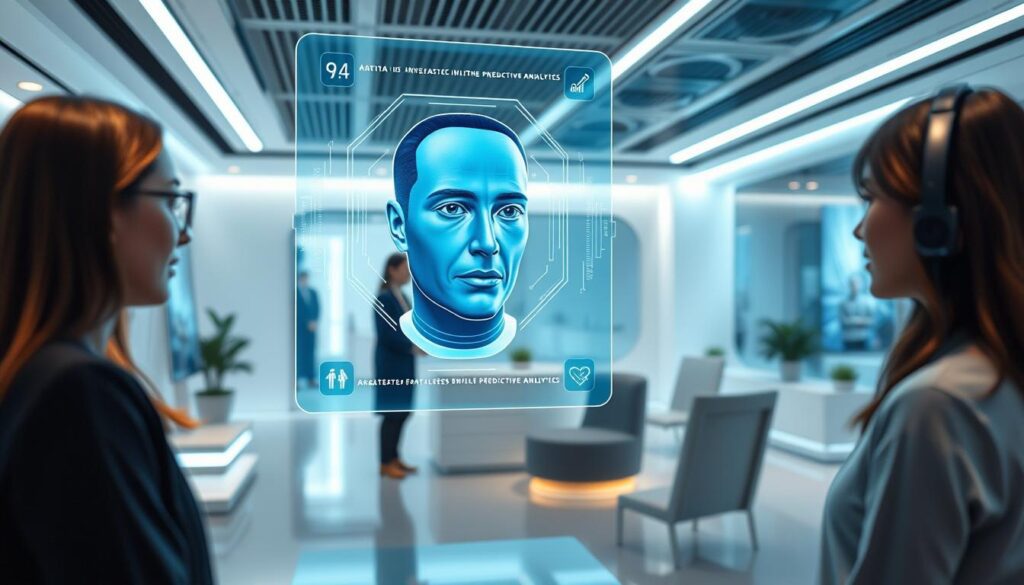Did you know that organisations using advanced contact centre solutions, such as Webex Contact Centre, have achieved a 20% call deflection rate? This has led to savings of nearly £3.6 million over three years. Such figures highlight the transformative power of technology in reshaping how businesses interact with their clients.
Initially, basic chatbots were designed to handle simple queries. However, the landscape has shifted dramatically. Today, sophisticated AI agents are capable of predicting customer needs and offering proactive solutions. This evolution has turned customer service into a dynamic, data-driven engine.
Technological advancements like dynamic call routing and real-time sentiment analysis are now standard. These tools not only improve efficiency but also enhance the overall experience. For instance, AI-driven workforce management can predict service demand, ensuring optimal staffing levels.
As we look ahead, the integration of AI into customer service promises even greater strides. Businesses that embrace these innovations will likely lead the market, offering unparalleled support and satisfaction. To explore more about this transformation, visit our detailed analysis on the evolution of customer service technology.
Key Takeaways
- Advanced AI agents can predict and address customer needs proactively.
- Real-time sentiment analysis enhances engagement and service quality.
- Dynamic call routing ensures efficient handling of customer inquiries.
- AI-driven workforce management improves staffing efficiency.
- Businesses adopting AI solutions see significant cost savings and improved satisfaction.
Historical Perspective of AI in Customer Service

The journey of artificial intelligence in customer support began with rudimentary systems designed to mimic human interaction. Early rule-based chatbots, such as ELIZA, were groundbreaking at the time but had significant limitations. These systems relied on pre-programmed responses, making them inflexible and unable to handle complex queries.
Over time, advancements in natural language processing (NLP) transformed these basic tools into more intelligent platforms. Pioneers like Allen Newell and Herbert Simon laid the foundation for modern AI, enabling systems to move beyond static responses. This evolution allowed businesses to offer more dynamic and personalised support to their clients.
From Basic Chatbots to Intelligent Systems
Initially, chatbots were limited to handling simple tasks, such as answering frequently asked questions. Their inability to understand context often led to frustrating experiences for users. However, the integration of NLP and machine learning marked a turning point, enabling systems to interpret and respond to queries more effectively.
Milestones in AI Development
Key milestones in AI development include the creation of early systems like ELIZA and the gradual shift towards intelligent assistants. These advancements have allowed businesses to leverage data-driven insights, improving both efficiency and customer satisfaction. Today, AI-driven platforms are capable of predicting needs and offering proactive solutions, revolutionising the support landscape.
Emergence of AI Agents in Modern Support

Modern customer support has undergone a seismic shift with the rise of intelligent systems. These platforms, powered by natural language processing and machine learning, are now capable of understanding context and intent. This evolution has transformed how businesses interact with their clients, offering faster and more accurate responses.
Recent advancements in natural language processing have enabled AI agents to learn from experience. By analysing vast amounts of data, these systems can predict customer needs and provide proactive solutions. For instance, platforms like ChatGPT have demonstrated how language processing can enhance the accuracy of responses.
The integration of voice, chat, and data analysis has further improved the capabilities of modern support systems. AI agents can now handle multiple interaction channels seamlessly, ensuring a consistent experience for users. This technical synergy between machine learning models and natural language capabilities underpins the sophistication of today’s customer support.
“The ability of AI agents to interpret context and intent is a game-changer for customer service.”
As businesses adopt these technologies, they are seeing significant improvements in efficiency and satisfaction. For example, AI-driven solutions are automating routine tasks, allowing human agents to focus on more complex queries. This not only saves time but also enhances the overall quality of support.
Integrating Natural Language Processing and Machine Learning
The combination of natural language processing and machine learning has revolutionised customer support. These technologies enable AI agents to understand and respond to queries with remarkable accuracy. Over time, these systems improve their performance by learning from interactions.
For instance, machine learning models analyse patterns in customer behaviour to predict future needs. This proactive approach ensures that businesses can address issues before they escalate. The result is a more efficient and personalised support experience.
Moreover, the integration of these technologies allows AI agents to handle complex queries that were once beyond their capabilities. By understanding the nuances of language, these systems can provide tailored solutions, enhancing customer satisfaction.
From Chatbots to AI Agents: The Evolution of Customer Service in 2025

The future of customer support is being reshaped by predictive analytics and intelligent automation. These technologies are transforming how businesses engage with their clients, offering personalised and efficient solutions. By 2025, companies leveraging these advancements will set new standards in the industry.
Predictive Analytics and Proactive Support
Predictive analytics enables companies to anticipate customer behaviour and tailor interactions accordingly. By analysing data patterns, businesses can identify trends and address issues before they escalate. This shift from reactive to proactive support ensures a smoother experience for users.
For instance, platforms like Webex Contact Centre use predictive analytics to forecast service demand. This allows companies to allocate resources effectively, reducing wait times and improving satisfaction. Proactive support not only enhances efficiency but also builds trust with customers.
Automation and Intelligent Call Routing
Intelligent call routing is another game-changer in modern customer service. This system directs inquiries to the most suitable agent based on expertise and availability. It ensures that complex queries are handled by the right person, improving resolution rates.
Automation also plays a crucial role in streamlining operations. Routine tasks, such as answering FAQs, can be managed by AI, freeing up human agents for more critical issues. This approach not only boosts efficiency but also reduces operational costs.
“Intelligent automation is revolutionising customer service, making it faster and more efficient than ever before.”
Industry leaders have reported significant cost savings and operational improvements. For example, companies using advanced automation tools have seen a 20% reduction in call handling times. These innovations are addressing traditional call centre challenges, creating seamless experiences for customers.
Innovative Technologies Redefining Customer Interactions
Innovative technologies are revolutionising how businesses engage with their clients, offering smarter and more efficient solutions. These advancements are not just enhancing efficiency but also creating personalised experiences that drive satisfaction and loyalty.
Real-Time Sentiment Analysis
One of the most transformative tools in modern customer service is real-time sentiment analysis. This technology allows businesses to gauge customer emotions during interactions, enabling them to respond appropriately. For instance, if a customer shows signs of frustration, the system can escalate the issue to a human agent immediately.
By analysing tone, word choice, and speech patterns, real-time sentiment analysis provides actionable insight into customer feelings. This proactive approach helps in resolving issues before they escalate, improving overall satisfaction.
Automated Transcription and Data Documentation
Another game-changer is automated transcription, which converts voice interactions into searchable text. This solution not only facilitates efficient data documentation but also ensures that no critical information is lost. For example, customer service teams can quickly search transcripts to find specific details, saving time and effort.
Moreover, this technology supports compliance and training efforts by providing accurate records of interactions. It’s a practical tool for continuous improvement in service quality.
Leveraging Deep Learning and Generative AI
Deep learning and generative AI are at the forefront of creating adaptive and personalised customer support experiences. These systems learn from vast amounts of data, enabling them to predict customer needs and offer tailored solutions. For instance, generative AI can craft responses that feel human-like, enhancing engagement.
By integrating natural language processing, these technologies ensure that interactions are not only efficient but also meaningful. They represent the future of customer service, where every interaction is seamless and personalised.
“The integration of deep learning and generative AI is transforming customer service into a proactive and personalised experience.”
To explore more about how these innovations are shaping the future of AI in customer service, visit our detailed analysis.
Integrating AI with New and Legacy Systems
Combining innovative intelligence solutions with existing infrastructure is a critical task for modern businesses. While legacy systems often struggle with data processing, integrating AI can unlock new capabilities and streamline operations. This integration ensures that companies remain competitive in a rapidly evolving market.
Customisable API Solutions and Omnichannel Platforms
One effective way to bridge the gap between old and new systems is through customisable API solutions. These tools enable seamless integration across various platforms, ensuring data flows smoothly between legacy and modern technologies. For instance, companies like American Express have successfully enhanced their fraud detection rates by 20% using such solutions.
Omnichannel platforms further amplify this capability by unifying chat, email, voice, and social media interactions. This approach ensures that customers receive consistent support, regardless of the channel they use. By leveraging these technologies, businesses can improve efficiency and satisfaction simultaneously.
However, merging AI with legacy systems isn’t without challenges. Compatibility issues and data silos can complicate the process. Yet, the benefits—such as reduced operational costs and improved accuracy—make it a worthwhile task.
“Customisable APIs and omnichannel platforms are transforming how businesses integrate AI, creating a unified and efficient support ecosystem.”
Real-world examples highlight the success of this approach. For instance, IBM’s AI-powered chatbots have significantly reduced response times, enhancing customer satisfaction. Similarly, Microsoft Azure’s predictive tools have improved network health monitoring, preventing unexpected outages.
By adopting these strategies, companies can future-proof their operations and deliver exceptional customer experiences. The way forward lies in embracing innovative solutions that harmonise old and new technologies.
Addressing Challenges and Security Concerns in AI Adoption
As businesses increasingly adopt intelligent systems, concerns around data privacy and AI reliability have come to the forefront. While these technologies offer significant benefits, they also introduce risks that must be carefully managed. From safeguarding sensitive information to ensuring accurate responses, organisations must navigate these challenges to build trust and deliver exceptional customer support.
Data Privacy, Security, and Mitigating AI Hallucinations
One of the most pressing issues in AI adoption is data privacy. With the rise of intelligent systems, sensitive customer information is often processed and stored, making it a target for cyberattacks. Robust security protocols, such as encryption and regular audits, are essential to protect this data. Additionally, AI hallucinations—where systems generate inaccurate or misleading information—pose a significant risk. These errors can undermine trust and lead to poor customer support experiences.
To mitigate these risks, companies are investing in advanced language processing tools that improve accuracy. For example, IBM’s AI Explainability 360 enhances transparency in decision-making, ensuring that AI systems provide reliable responses. By addressing these vulnerabilities, businesses can maintain the integrity of their customer support operations.
Overcoming Inaccurate Responses with Human Oversight
Another challenge is the ability of AI systems to handle complex queries accurately. While AI excels at processing large volumes of data, it can struggle with nuanced conversations. This is where human oversight becomes crucial. By combining AI’s efficiency with human expertise, organisations can ensure that responses are both accurate and empathetic.
For instance, hybrid models that integrate AI with human agents are gaining popularity. These systems allow AI to handle routine tasks while escalating complex issues to human specialists. This approach not only improves accuracy but also adds a personal touch to customer support interactions. As one expert noted,
“Human oversight is essential to balance AI’s capabilities with the need for personalised, high-quality support.”
By implementing these strategies, businesses can overcome the challenges of AI adoption and deliver safer, more effective customer support solutions.
Enhancing Human-Agent Collaboration in Customer Service
The synergy between AI and human agents is transforming customer support. By combining the efficiency of technology with the empathy of human interaction, businesses are delivering more personalised and effective solutions. This hybrid approach ensures that customers receive both speed and understanding, enhancing their overall customer experience.
Hybrid AI-Human Approaches for Personalised Support
Hybrid systems leverage AI to handle routine tasks, freeing up human agents to focus on complex queries. For instance, AI can manage FAQs or process transactions, while human agents handle emotionally charged or intricate issues. This division of labour not only improves efficiency but also ensures that customers feel heard and valued.
Case studies show that such integrations have significantly improved response times and customer satisfaction. For example, a telecom company reported a 30% reduction in wait times after implementing a hybrid model. By providing access to both AI and human expertise, businesses can offer tailored solutions that meet diverse needs.
Retaining the Human Touch in Critical Interactions
While AI excels at processing data, it often lacks the emotional intelligence required for sensitive situations. This is where human agents play a crucial role. They can interpret tone, empathise with frustrations, and provide reassurance, ensuring that customers feel supported.
Strategies for maintaining the human touch include training agents to use AI tools effectively and encouraging empathy in every interaction. As one expert noted,
“The balance between technology and humanity is the cornerstone of exceptional customer experience.”
By valuing both digital efficiency and interpersonal relationships, businesses can create a support system that is both innovative and compassionate. This approach not only enhances customer satisfaction but also builds long-term loyalty.
Future Prospects: Agentic AI and Customer Experience
The rapid advancement of agentic systems is reshaping how businesses approach customer interactions. These intelligent platforms are designed to handle complex tasks autonomously, offering personalised and efficient solutions. As organisations embrace these technologies, they are setting new benchmarks for customer experience.
Emerging Trends in Autonomous Systems
One of the most significant trends is the increasing application of autonomous systems in customer support. These systems are now capable of handling a wider range of tasks, from answering routine questions to resolving technical issues. For instance, 81% of companies plan to implement visual AI technology, enhancing their ability to engage with clients.
Another trend is the integration of agentic systems across multiple channels. This ensures a seamless experience for customers, regardless of how they choose to interact. By 2025, generative AI could handle up to 70% of customer interactions without human intervention, improving satisfaction by 30%.
Long-term Implications for Business Operations
The adoption of agentic systems offers significant long-term benefits. Businesses can achieve substantial cost savings by automating routine tasks and reducing the need for human intervention. For example, over 30% of companies using AI for customer calls have reduced average handle time by up to 60%.
Moreover, these systems enhance operational efficiency by predicting customer needs and addressing issues proactively. As one expert noted,
“The integration of agentic systems is not just about efficiency; it’s about creating meaningful and personalised experiences.”
However, challenges remain. Ensuring data privacy and maintaining accuracy are critical for building trust. Businesses must also stay adaptable, embracing new models and technologies to remain competitive in today’s market.
By leveraging the potential of agentic systems, companies can transform their operations and deliver exceptional customer experience. The future lies in balancing innovation with the human touch, ensuring that technology enhances rather than replaces meaningful interactions.
Conclusion
The integration of intelligent systems into support operations has redefined how businesses connect with their clients. From basic tools to advanced platforms, the journey has been marked by significant milestones. Predictive analytics and automation have reshaped delivery, ensuring faster and more personalised responses.
Human-machine collaboration remains central to this transformation. While technology enhances efficiency, the human touch ensures empathy and understanding. Addressing challenges like data privacy and accuracy is crucial for safe adoption.
Looking ahead, the benefits are clear. Integrating modern solutions with legacy systems optimises interactions, reducing costs and improving satisfaction. By embracing this approach, businesses can unlock new levels of efficiency and trust.
Want to hire me as a Consultant? Head to Channel as a Service and book a meeting.

